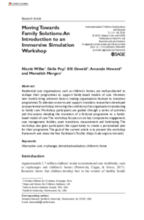Displaying 1501 - 1510 of 4403
In this blog post, the Global Social Service Workforce Alliance describes how the social service workforce is responding to the COVID-19 pandemic and highlights relevant resources and tools.
This brief from UNICEF outlines the urgent action needed to put migrant and displaced children at the forefront of UNICEF’s preparedness, prevention and response to COVID19 – to ensure health, safety, and protection for all.
Develop an understanding of some of the approaches involved in caring for vulnerable children, with this free online course.
In this interview, Andy Bilson - Emeritus Professor at the University of Central Lancashire, Associate Director of The Centre for Children and Young People’s Participation, and researcher promoting children’s rights and reform of child protection systems - discusses the trends in children's care and protection in the UK and globally over the past few decades.
The goal of the current article is to present this workshop framework and share the free Facilitator’s Toolkit.
This article outlines six key recommendations for swift global action and describes UNICEF's commitments to work with communities, governments and partners to slow the spread of COVID-19 and minimize the social and economic impacts on children and their families.
This special presentation by Barbara Fallon of the University of Toronto and Delphine Collin-Vezina of McGill University is the first in a series of free ISPCAN webinars focused on the effects of COVID-19 on children, families, and systems of care.
This note sets out how the children and young people your organisation supports are affected and what you can ask your government to do to ensure that they have the information they need to stay safe.
This survey is intended to help identify practices and innovations that members of the social service workforce are carrying out in the field.
In this webinar, Barbara Fallon of the University of Toronto and Delphine Collin-Vezina of McGill University will share information from the new University of Toronto Policy Bench report, Child Welfare and Pandemics Literature Scan (Sistovaris et al., 2020), including current knowledge of child welfare and pandemics, the impact on children in the Canadian child welfare system, potential policy solutions that could mitigate the detrimental effects of pandemics, and the measures taken to control the spread of disease.


